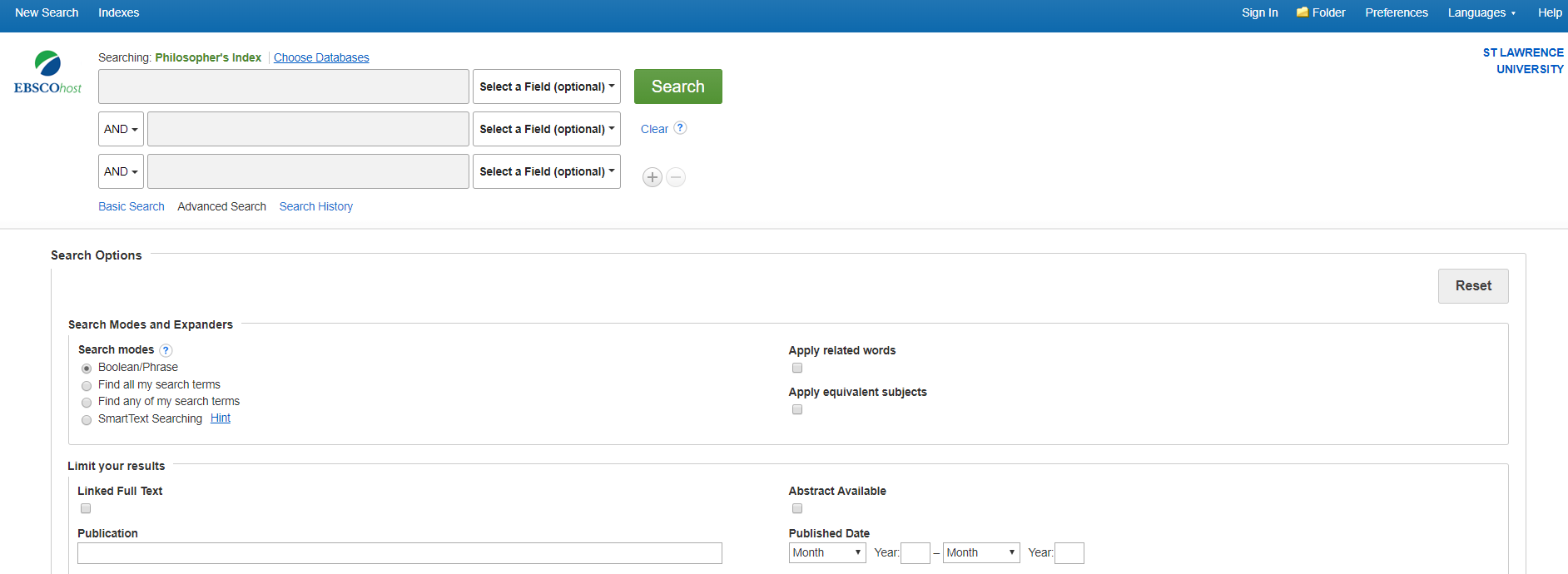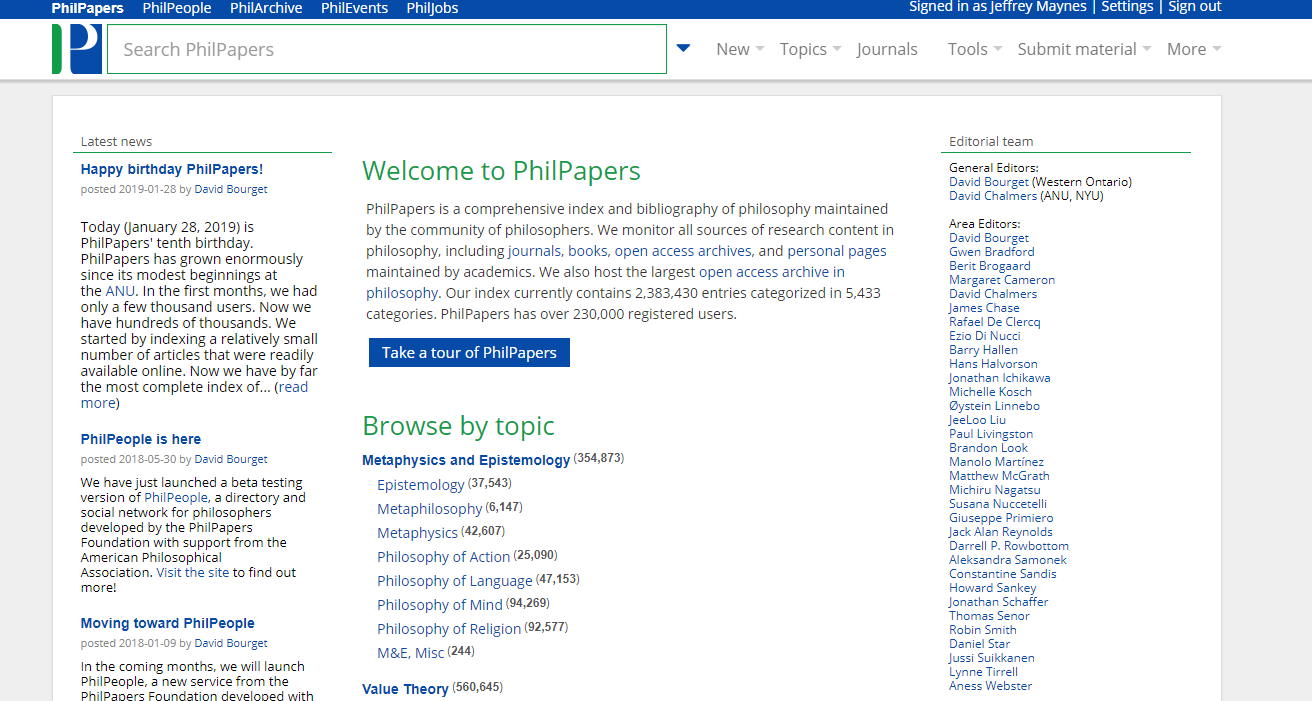How to Do Research in Philosophy
For most philosophers, research in philosophy looks a lot like studying philosophy - reading and writing (though, there is also Experimental Philosophy!). I already covered those skills in two other guides, so here I will focus on how to find your way with a new research question, and in particular, how to find sources.
First Steps
The first step in doing philosophical research is to hone your question and research terms. This is important because databases can only search the terms that you provide, they cannot search based on what you really meant to search for. You’ll want to know the terms that philosophers working on that question use, so that can more easily find some initial sources. A few ways you can get started:
- The most obvious is to use course readings. If you are writing a paper that is building off what you’ve already done in class, then those readings are the best place to start in finding the relevant terminology.
- Use a subject guide, such as the categories on PhilPapers. This site has bibliographies on a number of philosophical topics, categorized by general area of philosophy. Browsing through these categories might help you figure out what terms philosophers are using for the question that interests you. The list of bibliographies can be found by browsing “Topics” on the top menu. Each topic has a short overview at the top, which will help you learn some key words.
- Ask your professor!
Once you have some of the general terms for your topic, you’ll want to get a clearer sense of how your question fits into that topic. One useful next step is to check out the secondary literature - or philosophical work about other philosophical work. That sounds like a mouthful, but it simply means finding sources that describe and provide an overview of a debate.
There are three things you should look for in these sources. First, what are the positions and points of debate? With this information in hand, you can figure out how the sources you find relate to one another, and where you might make a contribution. Second, what additional terms and keywords can you find for conducting better searches of the primary literature? The more you know about a debate, the more specific your searches will get, and the more useful your results will be. Third, and finally, look at the sources - both how they are described in the text, and the information in the bibliography. If the article tells you that Nguyen (2017) argues for some claim X that is relevant to your project, head to the bibliography to find out where you can find Nguyen’s paper!
One way to find secondary sources is to look for books on your topic. Most philosophical topics have several general overviews written on them, with chapters on many of the sub-fields. On the internet, there are a few places I’d recommend:
The Stanford Encyclopedia of Philosopphy
The Stanford Encyclopedia contains up-to-date, peer-reviewed, overviews of philosophical topics written by experts on those topics. 
The Philosophy Compass is a peer-reviewed journal devoted to publishing critical overviews of contemporary debates in philosophy. 
Tracking down Articles
Once you’ve got your sense of the debate, and you know some keywords, it is time to look for articles. There are two basic strategies for finding articles.
Following the Conversation
The first is to look to the bibliographies of the sources you’ve found (including the secondary literature). Philosophy is a conversation - philosophers are typically writing in response to the ideas and arguments of other philosophers. This means that following the references can help you find work by other philosophers on the same questions you are interested in.
This is precisely why citation is so useful. A citation is an address. Your home address tells others how to find you - what country, what town, what street, and what house or apartment. If you know how to read addresses, you can use any address to find the home you want. Similarly, if you know how to read a citation, you can find any article you need. Take the format of an APA citation for example:
Last Name, First Name (Year Published). Article title. Journal Name, Volume(Issue), pp. Pages.
You can use this to find the journal directly through the library website (just click ‘Journal Titles’ above the search bar), and browse to find issues published in the right year, and then to find the volume and issue you are looking for. You can take the author name and article title, and plug them into one of the databases discussed below. Either way, following the conversation will help you track down articles on your topic that are part of the debate.
Google Scholar is also a helpful tool for this kind of research. When you find an article that looks valuable to your research, you can find it on Google Scholar and see who has cited it. This way, you can find replies and further scholarly work that is directly in conversation with your original source.
Heading into the databases
Your other option is to search the databases using your keywords. The primary databases for Philosophy are Philosopher’s Index, and PhilPapers. Each has its own advantages. Philosopher’s Index is an EBSCO database, which means that you search not only philosophy articles, but articles in other disciplines at the same time (to do so, just click “Choose Databases” above the search bar, and then click the boxes for all the databases you want to add to your search). This is particularly helpful when doing research on interdisciplinary topics. PhilPapers has topic guides, as well as, sometimes, links to the drafts of papers that our library does not have a subscription to. I always use both in my own research.
Whichever you use, the process is simple. Start by searching for your keywords. Read through the abstracts of any articles that look interesting. If they are on your topic, save the article, and look for more keywords you can try. If none of the abstracts look relevant to your topic, it is time to try some new keywords. Repeat the process, trying new keywords, looking for new ideas in the abstracts, and saving anything that looks useful. By the end, you’ll have compiled a list of potential sources, and it is time to dive in!
The Philosopher’s Index is an extensive database of philosophical sources. 
PhilPapers is a philosophical database and repository with useful topic guides to find papers on your topic. 
